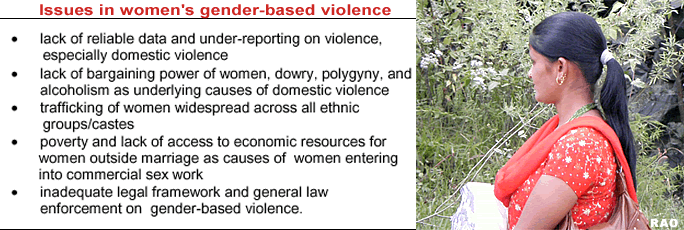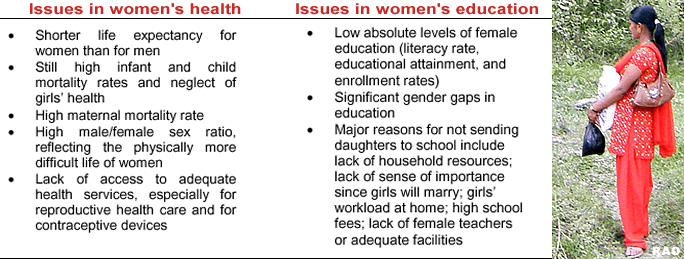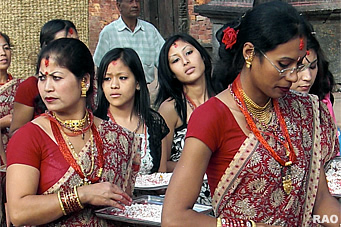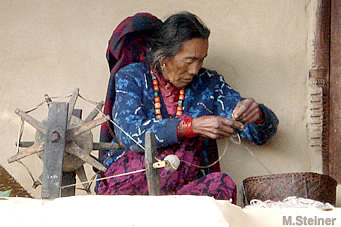|
top
|
Violence
against women
|
 |
95
percent of the women and giris surveyed reported first-hand knowledge of
violence, of which 77 percent was from their own family remembers. Such
violence was reported across all ethnic, caste, and income groups. Beating
was reported as the most common form of violence by both women and girls
(82 percent), followed by assault, rape, and forced prostitution
About one third of the respondents reported knowledge of sexual harassment
in public places, and about one fifth reported knowledge of it occurring
in the workplace.
Domestic
Violence
Studies
on violence in Nepal have concentrated on public violence and trafficking
while ouly little information has been collected on domestic violence.
According to the New ERA (1997) report, however, one of the major
causes of women leaving the married household has been polygyny and subsequent
violence against one of the cowives. Alcohol-related violence in
the domestic arena was reported high all over Nepal and across all communities.
Incidents of dowry-related violence are reported to a lesser extent. This
could be due to lack of information collection and reporting, and
the myth that traditionally a dowry system has not existed in Nepal.

|
In
Western hills and in some Indo-Aryan communities, however, a "bride price"
system, similar - to the dewry system, is prevalent. In the Maithili communities
of Westem Terai as well, a system called a Tilak has been widely practiced
under which a bride's price is negatiated and received by the groom or
his family before marriage. Traditionally, a milder form of dowry has been
also prevalent among theBrahmins, Chetris, and Newars in Nepal's hill areas.
The dowry usually consists of bed and bedding and some utensils.
|
Standing up for women's rights
|
 |
It is estimated that 70 percent of women will experience some form of violence in their lifetime. For Pushpa Shreevastava the violence she experienced was so extreme she was confined to bed for three months.
Pushpa's husband paid six men to beat her and rape her because, in his eyes, she had failed him by giving birth to a third baby girl.
"He paid someone to break my leg," said Pushpa. "He also hit my back with a hammer. I was in bed for three months. At the same time as the attack he had organised for six people to rape me. He hoped I would commit suicide."
Puspha's husband had illegally married another woman and wanted Pushpa dead so that he could start his new life. Pushpa was left homeless with three children, but they were taken in by an elderly couple who lived in the village.
Pushpa joined a community group supported by CARE which gave her the confidence to file a legal case against her husband. She knows she is entitled to half of the land her husband still lives on. She has also filed a case against him on charges of polygamy.
Pushpa said, "I filed a case against him for half our property and was told I could also file one for polygamy. He keeps trying to meet me so I will drop the case. I would rather die than meet with him."
As Pushpa's own fight for justice continues she concentrates her energies on helping other abused women in her community.
"I didn't have any way to express myself but the group helped me to meet people. Thanks to CARE I have learnt about women's rights and I now help other women. I have taken people responsible for rape to the police as well as a young girl's in-laws who weren't feeding her when she was pregnant. People in the community now know they will be held accountable," said Pushpa.
Nepal's civil war ended in 2006 but violence against women still continues as society takes it frustrations out on women.
 |
| Source: CARE International, 2010 |
top
| more information |
 |
|
Links
|
 |
 |
 |
External
Links |

Asian
Development Bank (ADB |

Maiti
Nepal
Against
traffiking |
|







